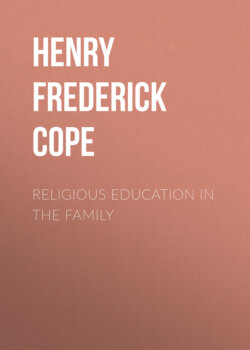Читать книгу Religious Education in the Family - Henry Frederick Cope - Страница 22
На сайте Литреса книга снята с продажи.
§ 2. POTENCIES TO BE PRESERVED—SOCIAL QUALITIES
ОглавлениеThe first great element to be preserved in all family life is that of the power of the small group for purposes of character development. The infant's earliest world is the mother's arms. In order to grow into a man fitted for the wider world of social living, he must learn to live in a world within his comprehension. A child's life moves through the widening circles of mother-care, family group, neighborhood, school, city, state, and nation into world-living. He must take the first steps before he is able to take the next ones. He must learn to live with the few as preparation for living with the many. In earliest infancy he takes his first unconscious lessons in the fine art of living with other folks as he relates himself to parents and to brothers and sisters.
Secondly, the family life affords the best agency for social training. The family is the ideal democracy into which the child-life is born. Here habits are formed, ideals are pictured, and life itself is interpreted. It is an ideal democracy, first, because it is a social organization existing for the sake of persons. The family comes nearer to fulfilling the true ideal of a democratic social order than does any other institution. It is founded to bring lives into this world; it is maintained for the sake of those lives; all its life, its methods, and standards are determined, ideally, by the needs of persons. It is an ideal democracy, secondly, because its guiding principle is that the greater lives must be devoted to the good of the lesser, the parent for the little child, the older members for the younger, in an attempt to extend to the very least the greatest good enjoyed by all. Thirdly, ideally it is a true democracy in that it gives to each member a share in its own affairs and develops the power to bear responsibilities and to carry each his own load in life. Thus the family group is the best possible training for the life and work of the larger group, the state, and for world-living.5 The maintenance of the ideals of the state, as a democracy, depends on the continuance of this institution with its peculiar power to train life in infancy and childhood for the life of manhood in the state. Such training can be given only in the smaller group that is governed by the motives peculiar to home and family life. The power to impress these principles depends on the size of the group. The small social organization, the family circle of from three members to even a dozen, bound by ties of affection, is the one great, efficient school, training youth to live in social terms.
Thirdly, the family sets spiritual values first. Our age especially needs men and women who think in terms of spiritual values, who rise above the measures of pounds and dollars and weigh life by personal qualities and worth. That is precisely what the home does. It prizes most highly the helpless, economically worthless infant; it measures every member by his personal character, his affectional worth. Its riches do not depend on that which money can buy, but on the personal qualities of love, goodness, kindness; on memories, associations, affection. The true home gives to every child-life the power to choose the things of the world on the basis of their worth in personality. Only the mistaken judgments of later years, the short-minded wisdom of the world, make youth gradually lose the habit of preferring the home's spiritual benefits to the material rewards of the world of business. No life can be furnished for the strain of our modern materialism that lacks the basis of idealism furnished in the true family.
